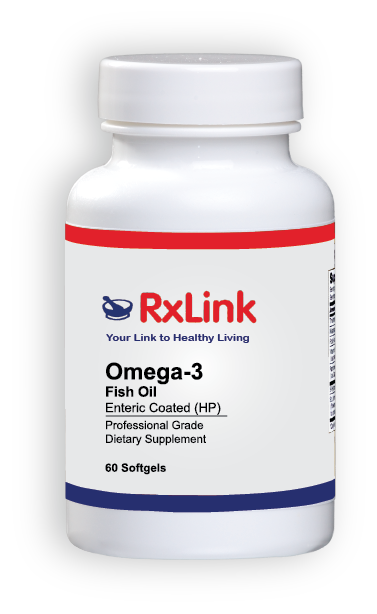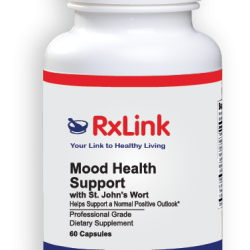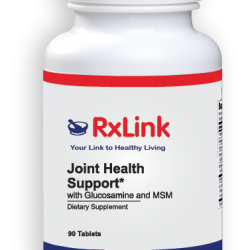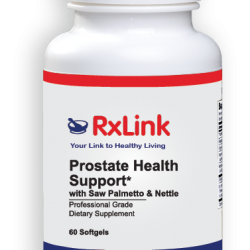Description
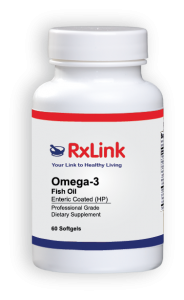
DESCRIPTION Omega-3 Fish Oil enteric-coated (HP) softgels supply significant amounts of essential omega-3 fatty acids, derived from marine lipid concentrate.
DESCRIPTION
RxLink Omega-3 Fish Oil enteric-coated (HP) softgels supply significant amounts of essential omega-3 fatty acids, derived from marine lipid concentrate. Processed by molecular distillation, our formula is an excellent source of these fatty acids, providing 300 mg of eicosapentaenoic acid (EPA) and 200 mg docosahexeanoic acid (DHA) per capsule. FUNCTIONS The omega-3 fatty acid EPA is the direct precursor for the anti-inflammatory prostaglandins E1 and E3, whereas DHA is of primary importance for the structural integrity of neuronal membranes. DHA is essential for brain and visual development and is vital throughout pregnancy to support fetal brain growth and formation of the retina and visual cortex. As the most abundant fatty acid in the brain, adequate amounts of DHA are needed throughout infancy and adulthood for ongoing optimal function. Low levels of DHA may adversely influence behavior and mental performance, and have been correlated with changes in disposition, memory loss, visual, and other neurological conditions.
Studies have shown that DHA, along with EPA may play an important role in cardiovascular health. One landmark study, the GISSI-Prevenzione Trial, involved over 11,000 people who had already survived myocardial infarction. This was the first large scale trial that showed supplementation of essential fatty acids significantly lowered the risk of death, and that use of this supplement was safe. The exact reasons for such dramatic benefits with respect to heart disease remains unknown, but may be related in part to the ability of fish oil to support healthy inflammatory processes. Some researchers believe that the body’s inflammatory response to certain factors, along with a fatty diet, can increase the amount of plaque in the arteries, leading to atherosclerosis. Studies indicate that EPA and DHA can act as precursors for the anti-inflammatory prostaglandins E1 and E3, and decrease the formation of pro-inflammatory prostaglandin E2 and thromboxane A2. Scientists have also suggested that omega-3 fatty acids can have a direct cardiac effect on arrhythmogenesis. Omega-3 fatty acids may be able to modify sodium channels by binding to the channel proteins. This could then help support healthy heart rhythms.
Additionally, our Omega-3 Fish Oil is enteric-coated (HP), significantly reducing the “fishy” taste sometimes associated with marine lipid supplements.
SIDE EFFECTS No adverse effects have been reported.INDICATIONS Omega-3 Fish Oil enteric-coated (HP) softgels may be a useful dietary adjunct for individuals wishing to supplement their diets with the essential fatty acids DHA and EPA. FORMULA (WW #RxLink10313)
1 Enteric-Coated Softgel Contain:
Fish Oil Concentrate…………1,000 mg
Eicosapentaenoic acid (EPA).300 mg
Docosahexaenoic acid (DHA)200 mg
Other Ingredients: Softgel (gelatin, glycerine and water), Vitamin E, modified cellulose, and triethyl citrate.
Molecularly Distilled
This product contains NO sugar, salt, dairy, yeast, wheat, gluten,, corn, preservatives, artificial colors or flavors.
SUGGESTED USE Adults take 1 softgel capsule daily or as directed by your healthcare professional. STORAGE Store in a cool, dry place, away from direct light. Keep out of reach of children. REFERENCES Dietary supplementation with n-3 polyunsaturated fatty acids and vitamin E after myocardial infarction: results of the GISSI-Prevenzione trial. Gruppo Italiano per lo Studio della Sopravvivenza nell’Infarto miocardico. Lancet 1999 Aug 7;354(9177):447-55. Markides M, Neumann MA, Byard RW, Simmer K, Gibson RA. Fatty acid composition of brain, retina, and erythrocytes in breast- and formula-fed infants. Am J Clin Nutr 1994;60:189-194. Makrides M, Neumann MA, Gibson RA. Effect of maternal docosahexaenoic acid (DHA) supplementation on breast milk composition. Europ J Clin Nutr 1996;50:352-357. Martinez MJ. Tissue levels of polyunsaturated fatty acids during early human development. J Pediatr 1992; 120:S129-138. Morrow-Tlucak M, et al. Breastfeeding and cognitive development in the first 2 yes of life. Soc Sci Med 1988;26:635-639. Neuringer M, Anderson GJ, Conner WE. The essentiality of n-3 fatty acids for the development and function of the retina and brain. Ann Rev Nutr. 1988;8:517-541. Fux M, Levine J, Aviv A, et al. Inositol treatment of obsessive-compulsive disorder. Am J Psychiatry. 1996;153:1219–1221. Gelber D, Levine J, Belmaker RH. Effect of inositol on bulimia nervosa and binge eating. Int J Eat Disord 2001 Apr;29(3):345-8 Levine J. Controlled trials of inositol in psychiatry. Eur Neuropsychopharmacol. 1997;7:147–155. Palatnik A, Frolov K, Fux M, Benjamin J. Double-blind, controlled, crossover trial of inositol versus fluvoxamine for the treatment of panic disorder. J Clin Psychopharmacol 2001 Jun;21(3):335-9

